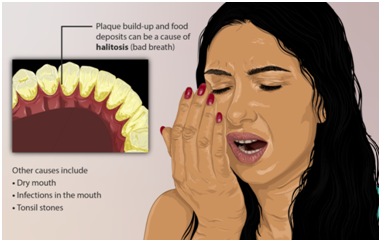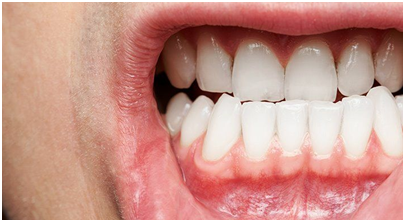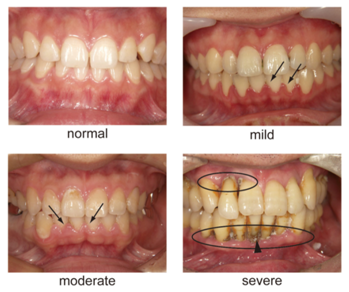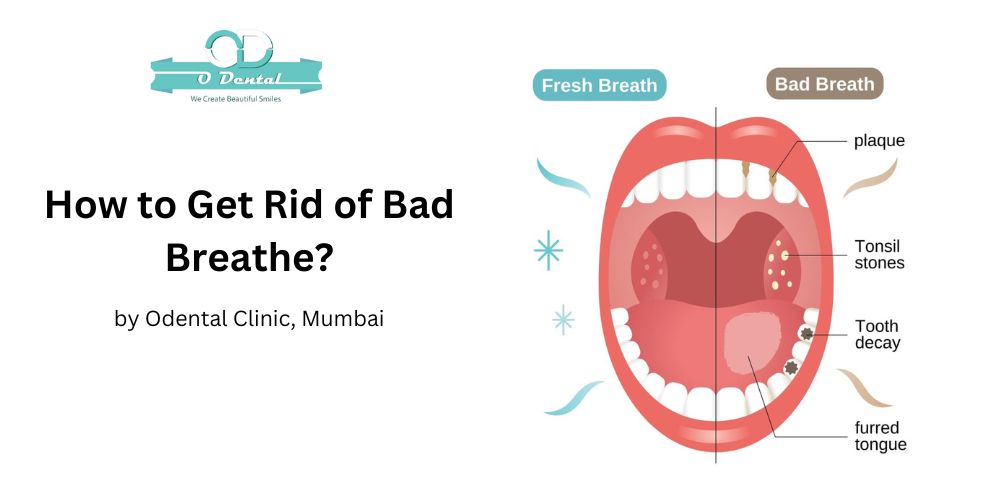It’s the tiny things that alert you to the fact that you have foul breath. Whenever others talk to you, some can turn their faces or move backward a tiny bit. It might harm your self-confidence as well as self-esteem. Although everyone has bad breath from time to time, it can be a regular challenge for some individuals. Sometimes people aren’t even conscious that they will possess halitosis and bad breath. Mates, relatives, and coworkers might be the first to hear about it.

What the difference between bad breath and halitosis?
Bacteria that dwell on the top of the tongue generate halitosis, and bad breath. Whenever this sulfur-producing bacterium breaks degrade proteins quickly in your mouths as well as throat, they create noxious-smelling volatile sulfur chemicals.
Bad Breath Causes as well as Symptoms
The following are symptoms of halitosis:
- You have a dry mouth.
- Upon that tongue, there is a white covering, especially near the back.
- Mucus and post-nasal dripping
- Bad breath as well as a scorching tongue in the morning.
- There is a persistent need to cleanse one’s throat.
- Thick saliva.
- Tastes metallic, sour, and somewhat bitter.
What Are the Signs That You Possess Bad Breath?
You might feel self-conscious whenever you think you have terrible breath. You might wish to ask a close friend or somebody you respect to see within your mouth. Inquire if indeed the underside of such tongue has a white covering. This is frequently a symptom of poor breath caused by bacteria. here are several bacterial infections that may affect your oral health like dental abscesses or even pyorrhea.
If you’re too ashamed to approach a buddy, you can make a consultation session with your dentist. He could examine the air coming from one’s mouth through the nose and give you a much more exact estimate of the cause of the odor if one exists. Your dentists can also assist you in determining the best treatment for foul breath.
Sniff Test
If you want to find out if one’s breath stinks, you can perform a simple sniff test. Inhale a scent after licking your wrists and waiting for this to dry. Flossing one’s teeth beside the bottom of one’s mouth and afterward smelling the floss is another option. You could also scratch your tongues and then inhale the scraper’s fumes.
What Are the Causes of Bad Breath?
Poor oral cleanliness and gum illnesses such as dry mouths, periodontitis, especially gingivitis are the most common causes of halitosis. One dentist would assist you in determining the exact reason for your problem.
Small instances of foul breath might be caused by respiratory illnesses or gastrointestinal ailments. Bad breath could be caused by severe liver or renal illness, and also uncontrolled insulin.

How to Stop Having Bad Breath
Brushing your teeth with a soft bristles toothbrush plus fluoridated mouthwash at minimum twice per day. Smoking could make the problem worse. Make a conscious effort to refrain from smoking and chewing nicotine. While going to sleep, constantly rinse one’s mouth using an alcohol-free mouthwash.
If you have a dry throat, drink plenty of liquids during the day. Over-the-counter drugs and dry mouth moisturizing products, such as rinses, mists, or gels, might be beneficial to you. Such agents could be obtained through a prescription from your dentist.
A Quick Guide to Gum Disease
Gum disease, also known as periodontitis, seems to be a bacterium infection as well as inflammation of the gums that damage the bone around your tooth. If left unchecked, this infection might lead to tooth removal.
Factors or the Cause of Gum disease
Plaque is a waxy and transparent coating that develops on teeth due to bacteria, primarily caused by bacteria. Bacteria could grow up and damage your tooth and gums if they are not cleaned. The bones that hold the gums eventually deteriorate, and the tooth falls out.
Plaque accumulation is mainly caused by poor dental hygiene. Gum illness is caused by not brushing your teeth, flossing daily, or visiting your dentist regularly.

Other reasons for gum infection
- Hormonal shifts happen throughout puberty, childbirth, menopause, as well as perhaps menstruation. Gums, teeth, and bones could become sensitive as a result of these changes.
- Illnesses that weaken your immune systems, such as cancer, diabetes, and HIV.
- Anticonvulsant drugs, for example, tend to reduce saliva generation and flow.
- Gum tissues are also harmed by bad behaviors like smoking.
- Gingivitis can also be passed down down the generations due to a parenting background of gum diseases.
Gum Diseases Stages
Plaque development causes gums inflammation inside the early stages of gum diseases. Gingivitis can develop if this collection is not removed by brushing as well as flossing. Whenever brushing and flossing, you might see bleeding. Any harm to the teeth or gums can potentially be repaired at this point.
The muscles and fibers that encircle your tooth are extensively destroyed in the 2nd phase of gum diseases. The gums would then form pockets, trapping foods. At this point, you’ll require adequate dental care to keep your gums from deteriorating further.
The fibers and bones around the tooth are destroyed inside the ultimate phase of gum disease, periodontitis, causing the tooth to loosen. It might necessitate extensive dental treatments or tooth extraction.

Gum Disease Signs
Gum disease could affect people of all ages, but it is more frequent in adults. This can be cured even reversed with correct dental therapy if caught early. Therefore, how can you tell if you have gum illness? Symptoms include:
- Gums that are inflamed, painful, or bleeding.
- Bad breath is a problem.
- Inside the mouth, there is a bad flavor.
- Teeth should be loosened.
- The gums are swollen and there is pus surrounding the teeth.
Gum Disease’s Risks
Gum disease has an impact on your general health. Cleaning your teeth could help avoid gum disease-related illnesses. Diabetes, rheumatoid illness, heart diseases, dementia, even stroke are just a few of the healthcare issues associated with periodontitis. This can potentially cause complications during pregnancy.
Conclusion
The great news is that brushing, flossing, plus seeing your dentists regularly can assist avoid gum diseases. Brushing your teeth using good fluoride toothpaste at minimum twice each day, plus floss one’s teeth thoroughly.

